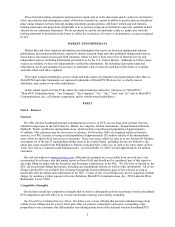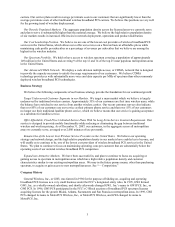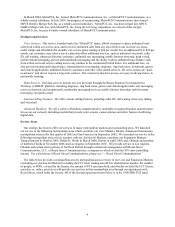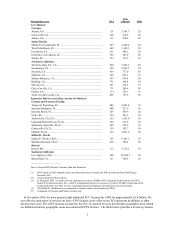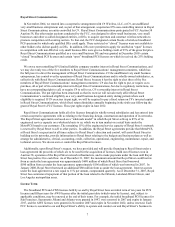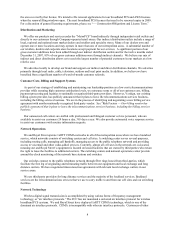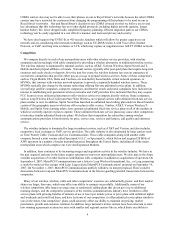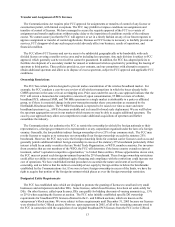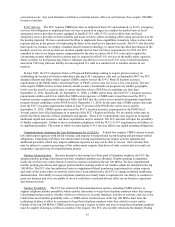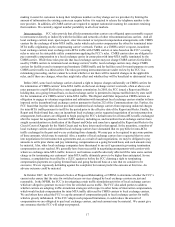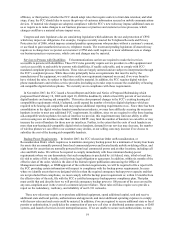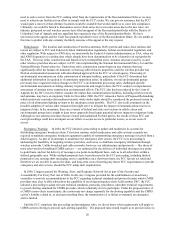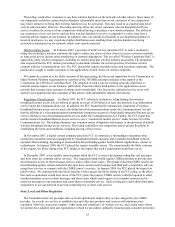Metro PCS 2007 Annual Report Download - page 23
Download and view the complete annual report
Please find page 23 of the 2007 Metro PCS annual report below. You can navigate through the pages in the report by either clicking on the pages listed below, or by using the keyword search tool below to find specific information within the annual report.12
already licensed spectrum which may allow new or existing licensees to provide services comparable to the services
we provide.
Construction Obligations and License Term
The FCC has established various construction obligations for wireless licenses with different requirements often
applying to spectrum licensed at different points in time. For example, all broadband PCS licensees, holding
licenses originally granted as 30 MHz licenses, must construct facilities to provide service covering one-third of the
population of the licensed area within five years, and two-thirds of the population of the licensed area within ten
years, or provide substantial service to the licensed area within the appropriate five- and ten-year benchmarks, of
their initial license grant date. All broadband PCS licensees holding licenses which originally were granted as, or
disaggregated to become, 10 MHz and 15 MHz licenses must construct facilities to provide service to 25% of the
licensed area within five years of their initial license grant date, or make a showing of substantial service. While the
FCC occasionally has granted brief extensions to, and limited waivers of, these requirements, any licensee failing to
meet these coverage requirements risk forfeiting their license. Either we or the previous licensee satisfied the
applicable five-year coverage requirement for each of our broadband PCS licenses and the ten-year requirement for
those PCS licenses with license terms expiring in January 2007. All AWS licensees will be required to construct
facilities to provide substantial service by the end of the initial 15-year license term. The initial 15-year license term
for our AWS licenses does not expire until November 2021.
The 700 MHz licenses being auctioned in Auction No. 73 are subject to stringent performance requirements
which are measured from the date of the digital television transition date, or February 17, 2009. Licensees of the
MSA/RSA and EA license blocks are required to build systems that provide wireless coverage to 35% of the
licensed geographic area in four years and 70% of the licensed geographic area by the end of the license term.
Licensees of the REAG license blocks are required to cover at least 40% of the population of the licensed area in
four years and 75% of the population of the licensed area by the end of the license term. Licensees of the
nationwide block are required to cover at least 75% of the population in four years, 95% of the population of the
nationwide license area within seven years and 99.3% of the population of the nationwide license area within ten
years.
The FCC grants broadband PCS licenses for ten-year terms that are renewable upon application to the FCC. Our
broadband PCS license terms began expiring in 2007. We filed renewal applications and have been granted
additional ten-year terms for all of our PCS licenses expiring in 2007. Other PCS licenses we hold will need to be
renewed in 2009. AWS licenses are granted for an initial 15-year term that is renewable for successive ten-year
terms upon application to the FCC. Our initial AWS license terms end in November 2021. The FCC will grant 700
MHz licenses with an initial term extending up to ten years from February 17, 2009 that is renewable for additional
10 year terms. If a licensee fails to meet the initial construction benchmark in four years from February 17, 2009,
the license term will be shortened to 8 years from February 17, 2009 in addition to the licensee possibly being
subject to fines and forfeitures and/or having its licensed service area reduced. If a licensee fails to meet the build
out requirements by the end of the license term, the licensee will lose its authority to serve any unserved area and
could be subject to fines and forfeitures.
The FCC may deny license renewal applications for cause after appropriate notice and hearing. The FCC will
award a renewal expectancy to broadband PCS, AWS, and 700 MHz licensees if the licensee meets specific
performance standards. To receive a renewal expectancy, we must show that we have provided substantial service
during our past license term, and have substantially complied with applicable FCC rules and policies and the
Communications Act. The FCC defines substantial service as service which is sound, favorable and substantially
above a mediocre service level only minimally warranting renewal. If we receive a renewal expectancy, it is very
likely that the FCC will renew our existing licenses. If we do not receive a renewal expectancy, the FCC may accept
competing applications for the license renewal period, subject to a comparative hearing, and may award the license
for the next term to another entity.
The FCC may deny applications for FCC licenses, and in extreme cases revoke FCC licenses, if it finds a licensee
lacks the requisite qualifications to be a licensee. For example, the FCC may revoke a license or deny an application
of an entity found in a judicial or administrative proceeding to have knowingly or repeatedly engaged in conduct
involving felonies, possession or sale of illegal drugs, fraud, antitrust violations or unfair competition, employment
discrimination, misrepresentations to the FCC or other government agencies, or serious violations of the
Communications Act or FCC regulations.


